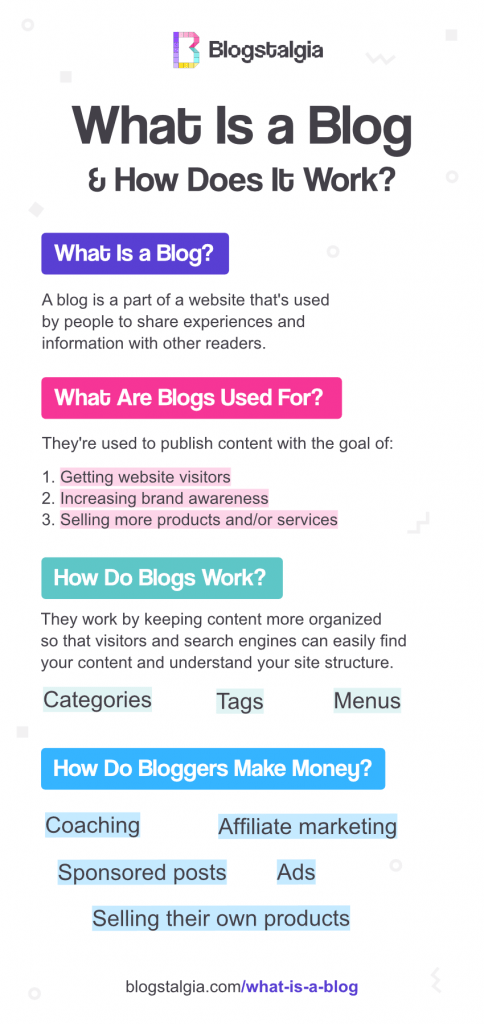The purpose of blogs has changed so much over the years.
Once they were used only to share personal stories and thoughts.
Now they’re used by individuals, small businesses, and huge corporations as a powerful marketing tool to reach more people and get more eyes on their products and/or services.
You might be thinking about starting your own blog to help grow your business but aren’t sure what exactly is a blog and how blogging works.
Or you might simply want to start a blog as a hobby.
Either way, we will answer most of the questions you might have about blogs and how they work.
Contents
- What is a blog?
- What are blogs used for?
- How does blogging work?
- How does blogging work to make money?
- What is a blogging platform?
- How to create a blog
- How to write a blog
- How did blogging start?
- Frequently asked questions
- What is a blog and how does it work infographic
What Is a Blog?
A blog is a part of a website that’s used by people to share experiences or information with other readers.
This type of content is typically known as “articles” or “blog posts,” and it’s displayed in reverse chronological order (newest to oldest).
Blog posts are mainly used to share dynamic content (content that changes often), whereas pages are used to display static content (content that doesn’t change often) like your “About” and “Contact” pages.
While blogs are typically run by one person or a small group of people, many of them are managed by larger companies that push tons of informational content.
What Are Blogs Used For?
While there are many different uses for blogs, most of them will fall into one of these two main categories:
- Hobby blogs
- Business blogs
Blogging as a Hobby
Hobby blogs are typically used by people to just share their thoughts and experiences.
These bloggers tend to just do it for fun and not as a way to generate extra income.
Hobby blogs are a great way for them to connect with other people who share the same interests.
Blogging as a Business
The main reasons businesses, freelancers, and solopreneurs use blogs are to get more people to visit their websites and increase brand awareness to sell more of their products and/or services.
Basically, a blog works as a powerful marketing tool.
Here’s how the process typically goes:
- A business writes a high-quality blog post about a specific topic, let’s say, “how to train your dog”
- People search on Google (or any other search engine) for “how to train your dog”
- The business’ article on dog training shows up on the first page of the search results
- People click on the listing to read the blog post
- People love the article and decide to purchase the company’s dog training eBook or hire them to train their dogs
Of course, it’s not that easy to rank on the first page of Google, but you get the idea.
Businesses can also use other platforms like Pinterest, Facebook, and Instagram to share their blog posts and get traffic to their websites.
How Does Blogging Work?
A blog works better for keeping your content more organized so that both your visitors and search engines can easily find your content and better understand the structure of your website.
Here are the three main ways you can organize the content on your blog:
- Categories
- Tags
- Menus
1. Categories
Categories are the most general method of grouping content in your blog. You can look at them as the main topics you’ll cover.
For example, if you have a fitness blog, you could create the following three categories:
- Weight loss
- Workouts
- Recipes
Then, whenever you write a blog post that focuses on losing weight, you can add it to the “weight loss” category.
Similarly, if you publish a nice recipe, you can add it to your “recipes” category.
Every blog post you write is required to have a category, and you can create as many categories as you’d like.
2. Tags
Tags are used to describe specific details of your blog posts and further organize them.
For example, if you write a blog post titled, “How to lose weight after giving birth,” you could add it to the “weight loss” category and add a “weight loss for women” tag.
As I mentioned earlier, every blog post you write must have a category, but tags are not required.
A mistake many beginner bloggers make is using tags on their blogs the same way the use them on social platforms like Instagram.
They just add a bunch of random tags thinking it will make their blog posts rank higher in search engines like Google.
That’s not how tags work on blogs, so there’s no need to stuff your articles with them.
3. Menus
Menus are typically located at the top of your blog and are used to give visitors quicker access to your main pages, products, and/or services.
These are also known as “navigation” or “primary” menus.
How Does Blogging Work to Make Money?
Even though there are A TON of blogs out there – 31.7 million in the US alone, according to Statista – not all of them make money.
In fact, most of them don’t.
This isn’t because blogging doesn’t work, but because beginner bloggers tend to treat their blogs as a “blog” instead of a business.
If you’re serious about making money online and making your blog work, you need to treat it just like you would any other type of business.
It’s also common for beginner bloggers to fall into the whole, “how to make $10,000 per month blogging in 90 days” hype.
There might be people who were able to grow they blogs fast, but those results aren’t typical.
Therefore, bloggers who believe this hype usually get discouraged and quit when they see they aren’t making much money after 90 days.
Those who have the drive to reach their goals and stick with them are the ones who bring in the money.
My advice is that you focus on getting $500 per month at the beginning.
Once you start consistently bringing $500 per month, you’ll see how much easier it is to start scaling and turning that into $2,000-5,000 per month and eventually six figures per year.
Anyway, here are some of the most common ways bloggers make money:
1. Coaching
Coaching is how I started making money with my fitness blog. In fact, I didn’t start my fitness blog with the goal of “making money blogging.”
I just build a website for people to be able to check out my services and contact me. It wasn’t until a few months later that I learned about using a blog to drive traffic to my website.
A good thing about offering your services is that you don’t need to have that many visitors to make a decent side income.
2. Affiliate Marketing
Affiliate marketing is one of the most popular ways bloggers make money online.
Basically, what you do is promote someone else’s product and get a commission whenever you make a sale.
When it comes to promoting and selling digital products, it’s completely normal to see companies offering their affiliates anywhere from 30-60% comission.
Yes, 60%. You read that right.
Just like with coaching, you don’t need a huge audience to make some decent money with affiliate marketing.
As long as you choose the right products and know/learn how to market them, you should be good.
That’s why so many bloggers love affiliate marketing.
3. Advertising
Another common way bloggers make money is by displaying ads on their sites.
The good thing about making money with ads is that it’s super passive.
You don’t need to worry about building a sales funnel, learning how to market products, or spend time coaching anyone.
All you have to do is join an ad network, start displaying ads, and money will come right in.
One of the biggest downsides of using ads is that to make a significant amount of money with them, you need to be driving a ton of traffic to your blog.
Another downside is that your readers might find them annoying.
But hey, you gotta pay the bills, right?
4. Sponsored Posts
Sponsored posts are when companies or other bloggers pay you to write about their products or services on your blog.
5. Selling Your Own Products
The ultimate goal for most bloggers is to create and sell their own products, that way, they can have complete control of their earnings.
An example of products bloggers create and sell include eCourses, eBooks, Photoshop presets, design templates, digital art, reusable sound effects, stock images, and web apps.
What Is a Blogging Platform?
A blogging platform is the place where you’ll set up and manage your blog and all the content you publish.
Types of Blogging Platforms
There are plenty of companies that offer free or paid services for launching and hosting a blog.
Blogger, Tumblr, and WordPress.com are just a few of those that allow you to host your blog for free.
The downside of using a free hosting platform is that you:
- Won’t own your blog
- The ways you can earn money are limited. For example, you can’t monetize with add or build membership sites.
- Will live under their brand. For example, your domain name would be YourCompany.Tumblr.com instead of just YourCompany.com
- Won’t be able to customize your website too much
- Won’t be able to use plugins to add more features and functions to your blog
- And more
This is okay if you just want to start a hobby blog, however, if you’re launching a business blog and plan to earn a living online, you should use a self-hosted blog with WordPress.org.
WordPress.org
WordPress is an open-source content management system (CMS), which means that anyone can use or modify the WordPress software for free.
A CMS is basically a tool that allows you to easily manage your website without having to know anything about programming.
The only costs associated with starting a blog with WordPress.org will be your domain name, which typically costs between $8-12/year, and a web hosting platform, which you can find for as little as $2/month.
The good thing about self-hosting your blog is that you own your website and have complete control of it.
You can monetize it however you’d like, install different plugins, and customize it.
How to Create a Blog
Creating a blog is actually super easy. Here’s how it works:
- Choose a blog topic (niche)
- Select a blogging platform
- Register your domain name (YourWebsite.com)
- Sign up for web hosting
- Select a WordPress theme
- Write blog posts
- Get traffic
- Make money blogging
Don’t worry, if you’re ready to launch your blog and need some guidance, you can check out my step-by-step guide on how to start a blog.
You’re also welcome to enroll in my 5-day blogging bootcamp and join our new Facebook group.
Grow Your Business on the Side
Free 5-day blogging bootcamp!
How to Write a Blog
As mentioned earlier, blogging like a blogger isn’t a good idea if your goal is to make money blogging.
In order to write a blog that converts readers into raving fans and customers, you need to do proper research.
You need to understand exactly what your readers want and offer a solution to their problems.
Here’s how the process of writing a blog post typically goes:
- Keyword research – find keywords that your ideal audience is typing on search engines like Google
- Write a catchy headline – headlines that create curiosity are very good
- Deliver what you promised
- Ask readers to subscribe to your list
I wrote an in-depth guide on how to write a blog post that converts you can check out after you’ve started your blog.
How Did Blogging Start?
Most experts agree that the first blog was Links.net, created by Justin Hall back in 1994.
However, the terms “blog” had not been coined yet, and Justing used to refer to it as his personal homepage.
People then followed the trend and began creating their own websites to share their personal lives and thoughts.
These people often referred to these types of websites as “online diaries.”
In 1997, the term “weblog” was coined by Jorn Barger to describe these types of websites.
Years later, the term “weblog” evolved to just “blog,” which is what we know and use today.
In 1999, the platform Blogger was launched and the popularity of blogs started increasing.
Today, we now have more than 600 million blogs and over 1.7 billion websites.
Pretty crazy, right?
Frequently Asked Questions About Blogging and How It Works
The last thing we’ll cover in this “what is a blog” article is some of the most common questions people wanting to start a blog have.
1. Where Do I Start Blogging?
If you’re looking to make money with your blog, you should start blogging on WordPress.org.
If you’re only interested in blogging as a hobby, you could choose a free blogging platform like Blogger or Tumblr.
2. On Which Topic Should I Start Blogging?
If your goal is to launch a blog to make money, you must make sure to choose a blog topic that’s profitable and that you feel comfortable writing about.
Having trouble coming up with a blog topic? You can explore this list of 100+ blog niche ideas to get some inspiration.
3. How Hard Is Blogging?
Blogging is hard work, especially at the beginning stages. You’ll spend tons of time researching, writing, and promoting your content.
If you have a more flexible budget, you could outsource some of these tasks to make things a little easier for you.
Once you start driving consistent traffic and making sales, the amount of work needed to maintain a blog decreases a lot, and you’ll have more free time.
Even though blogging might be hard work at the beginning (just like any other business, really), it is definitely worth it.
4. Do Bloggers Get Paid?
Yes, bloggers can get paid by selling other people’s products (affiliate marketing), writing about other people’s products or services (sponsored posts), displaying ads, freelance, content writing, and more.
What Is a Blog and How Does It Work Infographic

Final Thoughts: What Is a Blog?
I hope you were able to learn what a blog is, how it works, and a bit more about them.
As I mentioned earlier, growing a blog is difficult but definitely worth it. Once your blog has grown significantly, the amount of work needed to maintain it will be much less.
Just make sure that you treat it like a real business.

